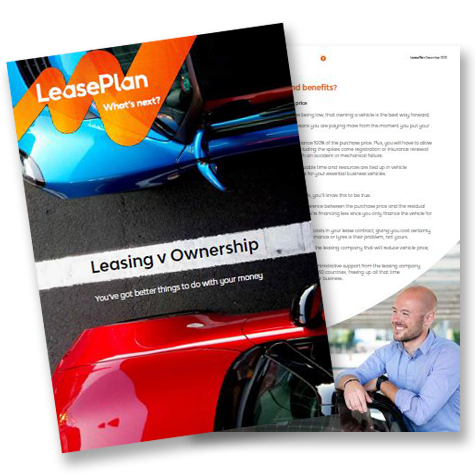
Should you lease or buy your company vehicles?
Fleet ManagementBuy or lease? It’s one of many questions you need to consider when deciding how best to meet your business’s transport needs. You could argue it’s the most important vehicle financing question, because it has a huge impact on how you will manage your vehicles.
We think leasing is hard to beat. It’s the best answer for most businesses. But we are in the vehicle leasing and fleet management business, so our perspective is hardly surprising.
That said, you wouldn’t be doing the required due diligence if you didn’t consider what buying outright would look like as an option in your vehicle funding decision process.
Get expert advice
Before we dive into the pros and cons of buying versus leasing, a word or two of caution. Obviously, we can only talk in general terms here but every business is unique. Your due diligence should aim to identify the best answer for your business’s unique situation. Our advice: consult widely…
- Talk to your accountant or finance department.
- Consider funding options in assessing vehicle options.
- Investigate funding options available via your bank, finance companies, car dealerships, etc.
- Talk to people running similar businesses.
- Contact fleet management companies.
Your goal here is to make the “lease or buy” decision with a full picture of what each option will mean for your business.
Consider the long term and the big picture
When we looked at the vehicle funding decision process, we stressed the need to consider the “total cost of ownership” (TCO) or “whole of life cost” of vehicles. This is essential here. You don’t want to be looking back in a few years and realise that you’ve paid more than you need to in vehicle expenses and capital costs.
It also pays to consider the changing transport environment we are all operating in. We think that EVs are the new black and covered the ways that they make financial sense.
Look at 2019 vehicle options. It’s very hard to ignore the low running costs of small EVs like the Nissan Leaf and Hyundai Ioniq. And, as a rule, greener options offer lower running costs.
As many vehicle manufacturers transition to favouring non-fossil-fuel-powered vehicles, choosing to ignore newer vehicle technology may have a larger cost, in terms of running costs over time. You also need to consider the government’s declared intention to offer financial incentives to aid the sale of EVs. Bottom line: there are large incentives to embrace new technology, regardless of upfront costs.
Indeed, the changing world comes into play. We recently asked the question: “Will we own anything by 2030?”. The sharing economy is growing all the time. And – housing market controversies aside – paying for the use of things, as needed, rather than owning them makes more and more sense all the time.
So, what does all this mean when it comes to buying or leasing your vehicles? Two things:
- Leasing offers a way around the high upfront costs sometimes involved in new vehicle technology, which gives you the access to lower running costs.
- Vehicles you buy today because they are less costly than ones with newer technology may cost you more in the medium to longer term in higher running costs.
Why would you buy a vehicle?
There are reasons you might like to buy a vehicle, if your business has the financial resources to pay a deposit and the cost of financing stacks up against leasing…
- You prefer to own your vehicles rather than be responsible to someone else.
- The fact that you own the vehicle once you have paid off any financing appeals to you.
- You travel large distances every year and fear excess mileage charges you may incur with leasing.
- You like or need to modify your vehicles extensively and returning the vehicle in a re-saleable condition at the end of a lease could be problematic.
- Your vehicles have a tough time of it, and meeting wear and tear conditions of a lease may be hard.
- You prefer to keep your vehicles for a long time rather than change them every 3 years or so.
Why would you lease a vehicle?
Regardless of the context we looked at, leasing is the best way to go for most businesses, small or large. Leasing means financing vehicles only for the time they are of maximum value to you and avoiding a significant deposit requirement. It makes sense for many reasons…
- It minimises the amount of cash tied up in vehicles and means there is no requirement for a significant initial outlay.
- You don’t incur the full cost of vehicle depreciation because you are only responsible (via lease payments) for depreciation when you are using the vehicle.
- Your monthly payments will most likely be less than payments on finance to purchase a vehicle because you are only paying for the portion of the vehicle’s life you have it.
- This frees up cash for other essential expenses or equipment you need to operate.
- It offers fixed vehicle costs over the term of the lease making budgeting easier.
- Allows you to replace vehicles at the end of their useful life and avoid increasing maintenance costs associated with older vehicles.
- And it offers the opportunity to outsource fleet management to experts and remove all the hassle of managing your vehicles from your to-do list.
The last reason to lease is often forgotten because business owners think fleet management isn’t for small businesses. In fact, working with a professional fleet manager can go a long way to mitigate the issues with leasing that often prompt SME owners to buy.
There is the obvious benefit of volume buying price discounts on cars and their running costs. There is also significant value in having expert support when it comes to all aspects of vehicle management from choosing vehicles to dealing with accidents and monitoring driver behaviour.
At SG Fleet / LeasePlan we have a number of small fleet lease products that offer leases that are much more than simple vehicle funding. These sorts of products offer everything from servicing and tyre replacement to “kilometre variation management” and Fringe Benefit Tax (FBT) management.
What about tax?
Speaking of FBT , let’s talk tax. Whether you buy or lease vehicles, there will be an impact on your tax obligations when in comes to GST and withholding tax as impacted by factors like depreciation. And any personal use of vehicles will mean that FBT must be considered.
There can be advantages to leasing over buying here but we encourage you to work through tax issues carefully with your accountant.
Will you lease or buy you next company vehicle?
By now it’s clear that there’s a lot to think about when it comes to choosing whether to buy or lease your company’s vehicles. As we have said, we think leasing is the best choice for just about any business. Regardless, the key is to do your due diligence and fully understand the impact of your choice.
Lease vs Buy whitepaper
Before you walk into that showroom make sure you are clear on the benefits of leasing v ownership.

Download our free Lease v Ownership paper to learn more.
Still wondering whether to buy of lease your business’ next vehicle?
Contact us for expert advice on your leasing options and ways to minimise risks associated with meeting your vehicle needs.
 Driving Insights
Driving Insights




